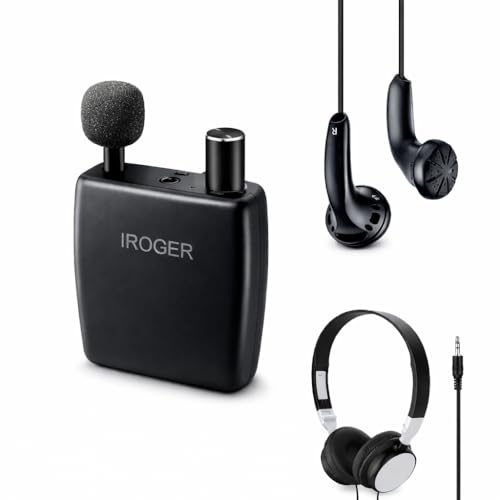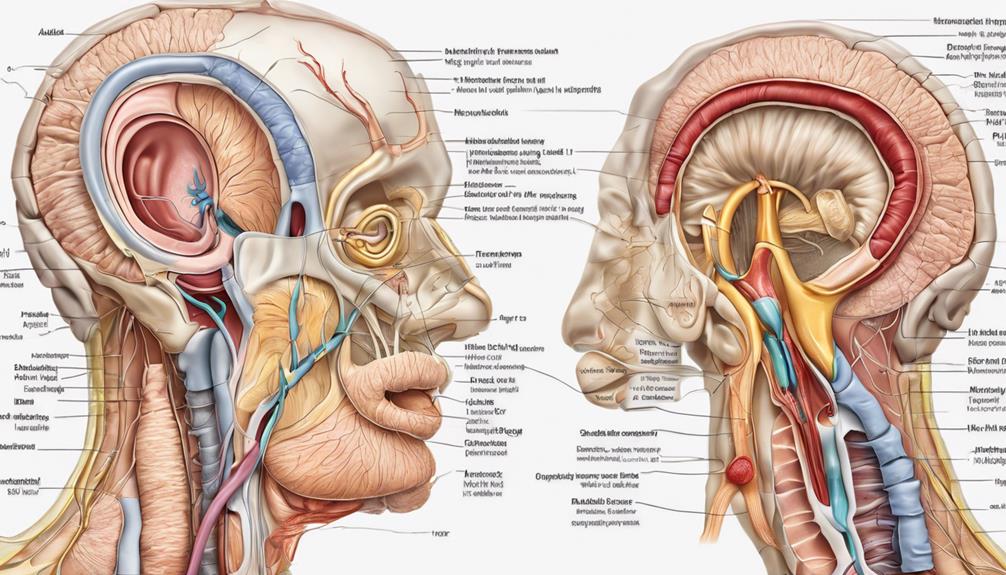When experiencing H3 hearing loss, we must navigate a world where quiet sounds may disappear, making conversations in noisy places challenging. This level of hearing impairment goes beyond inconveniences, impacting our social interactions and professional endeavors.
However, understanding the nuances of H3 hearing loss can open doors to strategies that help us reclaim our auditory experiences. So, how exactly does H3 hearing loss shape our hearing abilities and what steps can we take to navigate this soundscape effectively?
Key Takeaways
- H3 hearing loss signifies the most severe level of hearing impairment.
- Communication barriers may require assistive devices for better interaction.
- Treatment options like hearing aids and cochlear implants can improve hearing abilities.
- Regular audiologic evaluations and compliance with treatment plans are crucial for managing H3 hearing loss.

IROGER Hearing Amplifier for Seniors, Personal Sound Amplifier, Smart Auto-Gain, Directional Microphone, Rechargeable with 120-Hour Battery, Headphones & Earbuds Included
Smart Auto-Gain Control – Enjoy crystal-clear sound at all times. iRoger automatically balances audio levels to enhance voices...
As an affiliate, we earn on qualifying purchases.
Understanding H3 Hearing Loss
Understanding H3 hearing loss requires a comprehensive evaluation to determine the extent of significant hearing impairment affecting both ears. Individuals classified as hard of hearing (H3) face challenges in various environments, especially with speech discrimination and understanding amidst background noise. Validation tests are essential to confirm hearing thresholds and assess speech understanding abilities accurately.
For those seeking a military waiver due to H3 hearing loss, specific restrictions and evaluation criteria must be met. These evaluations are crucial not only for initial waivers but also for the renewal process, ensuring that the individual's hearing levels align with the established criteria.
The impact of H3 hearing loss goes beyond the basic ability to hear; it can significantly affect how individuals interact and communicate with others. By understanding the complexities of H3 hearing loss through thorough evaluations, we can better serve those who are hard of hearing and provide them with the support they need.

Neosonic Rechargeable Hearing Amplifier to Aid TV Watching and Conversation, Wireless Neckband Headphones for Seniors & Adults, Remote Microphone Noise Cancelling - NW10 Pro
BACKGROUND NOISE REDUCTION - Equipped with a wireless external microphone, the NW10 Pro allows you to place the...
As an affiliate, we earn on qualifying purchases.
Causes of H3 Hearing Loss

H3 hearing loss is typically attributed to significant impairments in both air and bone conduction thresholds. Common causes of this type of hearing loss include exposure to loud noise, genetic factors, aging, and certain medical conditions. Here is a table summarizing the causes of H3 hearing loss:
| Causes | Description |
|---|---|
| Loud Noise Exposure | Prolonged exposure to loud noises can damage the delicate structures in the inner ear. |
| Genetic Factors | Inherited genetic mutations can lead to abnormalities in the ear structures. |
| Aging | Natural aging processes can result in degeneration of the auditory system. |
Individuals with H3 hearing loss may find it challenging to hear softer sounds and struggle with speech comprehension, even with amplification. It is essential for those experiencing these difficulties to seek evaluation by an audiologist to determine the extent of the hearing loss and explore suitable treatment options such as hearing aids or cochlear implants.

Joanbro Personal Sound Amplifier for Seniors, Voice Enhancement Devices, Pocket Sound Amplifiers for Elderly People, Adults, 50dB Gain, with Headphones & Earbud, 3 Types Mics, 3 Tone, Volume Control
SUPERIOR PERSONAL SOUND AMPLIFIER: Applying noise cancelling, automatic gain control and advanced amplifying circuit, this sound amplifier device...
As an affiliate, we earn on qualifying purchases.
Effects on Hearing Abilities
Individuals with H3 hearing loss may experience considerable challenges in their hearing abilities, impacting their daily communication and interactions. H-3 hearing loss signifies the most severe level of hearing impairment, leading to significant difficulty in hearing and understanding speech.
This can result in communication barriers and the need for assistive devices to facilitate interactions. Due to the extent of hearing impairment associated with H-3 profiles, individuals may face limitations in eligibility for certain occupations or activities that require optimal hearing abilities.
Managing H-3 hearing loss often involves specialized interventions and support services tailored to address the unique needs of those with severe hearing impairments. These interventions aim to enhance communication effectiveness and quality of life for individuals with H-3 hearing loss.

IROGER Hearing Amplifier Rechargeable Hearing Device with Standard Headphone Personal Sound Amplifier PSAP for Ears,Seniors,Directional Microphone
Auto Gain Control for Clearer Sound-- Automatically adjusts volume levels to deliver balanced, high-quality sound amplification. Ideal for...
As an affiliate, we earn on qualifying purchases.
Treatment Options for H3 Hearing Loss

Considering the challenges that individuals with H3 hearing loss face in their daily communication, exploring effective treatment options becomes crucial for improving their quality of life.
Treatment for H3 hearing loss may involve the use of hearing aids, cochlear implants, and assistive listening devices. Hearing aids are commonly recommended to amplify sounds, making it easier for individuals with H3 hearing loss to hear and engage in conversations.
Cochlear implants, on the other hand, are surgical interventions suitable for severe cases of hearing loss. These implants work by directly stimulating the auditory nerve, bypassing damaged parts of the ear.
Additionally, assistive listening devices such as FM systems or captioned telephones can enhance communication in specific environments for those with H3 hearing loss.
In some cases, rehabilitation programs and auditory training may also be suggested to help individuals maximize their hearing potential, contributing to an improved overall hearing experience.
Managing H3 Hearing Loss
How can regular audiologic evaluations aid in effectively managing H3 hearing loss?
Regular audiologic evaluations play a crucial role in managing H3 hearing loss by monitoring changes in hearing thresholds over time. These evaluations help audiologists determine the progression of hearing loss and adjust treatment plans accordingly. For individuals with H3 hearing loss, the use of hearing aids or other assistive devices is often recommended to improve communication and quality of life. Additionally, compliance with hearing conservation programs and protective measures is essential for maintaining hearing health and preventing further deterioration.
In specific professions such as aviation, pilots with H3 hearing profiles must adhere to strict guidelines to ensure the safe operation of aircraft. Education and awareness about the impact of noise exposure on hearing are also vital for individuals with H3 hearing loss, especially for pilots who are regularly exposed to high levels of noise. By actively participating in audiologic evaluations and following recommended interventions, individuals with H3 hearing loss can effectively manage their condition and preserve their hearing health.
Frequently Asked Questions
What Does H3 Hearing Loss Mean?
H3 hearing loss signifies the most severe level of impairment. Communication challenges without amplification are significant. Military service with H3 profile necessitates a hearing waiver with strict validation.
Hearing aids are often vital for effective communication. Regular assessments are required for waiver renewals.
What Are Bad Numbers for a Hearing Test?
When it comes to bad numbers on a hearing test, values above 25 decibels indicate some level of hearing loss.
Numbers exceeding 40-50 decibels signal significant impairment, affecting daily communication.
Severe hearing loss, classified by numbers above 70 decibels, may require interventions like hearing aids or cochlear implants.
Consulting with an audiologist is crucial for understanding the implications of specific test results on one's hearing health.
What Is Category 3 Hearing Loss?
Category 3 (H-3) hearing loss pertains to a bilateral pure-tone average threshold between 56-65 dB in the better ear. This signifies a moderate level of hearing impairment that can impact speech comprehension in noisy settings.
Individuals with H-3 profiles may benefit from hearing aids to improve communication and situational awareness. Pilots with H-3 hearing loss must meet specific validation requirements for safe aviation practices.
Renewal criteria for hearing waivers tied to H-3 profiles involve periodic audiometric assessments and validation procedures.
What Is Level 3 Hearing Loss?
Level 3 hearing loss signifies a severe impairment in hearing ability. It often necessitates specialized interventions like hearing aids or cochlear implants. Understanding speech can be particularly challenging for individuals with this level of hearing loss.
Military occupational options may be restricted for those with Level 3 hearing loss, and stringent validation requirements and renewal criteria apply.
This degree of impairment requires comprehensive support and management strategies.
Can H3 Hearing Loss Be Caused by Sinus Infections?
Yes, sinus infections can lead to hearing loss. The inflammation and congestion caused by sinus infections can affect the eustachian tube, leading to fluid buildup in the middle ear and temporary hearing loss. If you experience sinus infections and hearing loss, seek medical attention.
Conclusion
In conclusion, managing H3 hearing loss is crucial for maintaining overall hearing health and improving communication abilities.
While some may hesitate to seek treatment for hearing loss, it's important to remember that modern hearing aids and assistive devices can greatly enhance quality of life.
By taking proactive steps to address H3 hearing loss, individuals can enjoy clearer conversations, better social interactions, and improved work performance.
Don't let hearing loss hold you back – seek help and embrace better hearing today.










